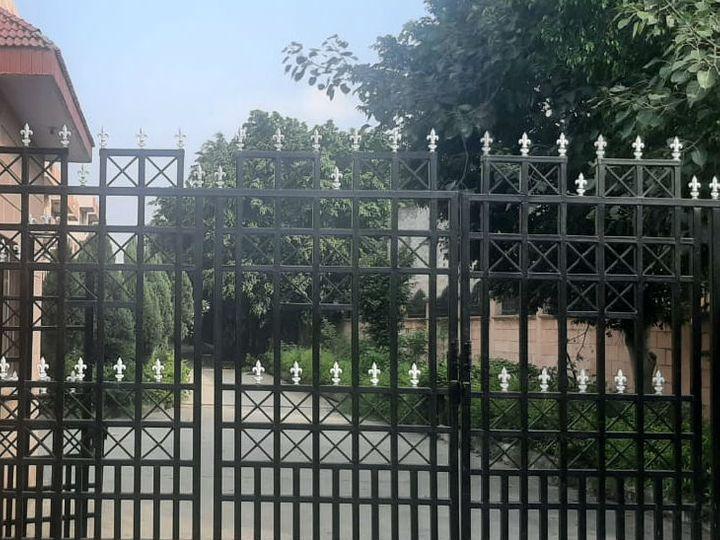UP: Ambedkar Hostel Converted into Detention Centre to be Inaugurated in October

Lucknow: With the COVID-19 pandemic continuing to claim more than a thousand lives in India on a daily basis, the first detention centre in Uttar Pradesh, meant to lodge illegal foreign immigrants and migrants overstaying in the state, is ready to function in the Nandgram area of Ghaziabad.
A pink boundary wall encircles the camp, with a 20-feet-high outer wall and an inner wall measuring six feet. The detention centre will also have watchtowers. The ten-foot high main gate is black and white, and the barbed wire on the walls suggests that the compound, around 35 kms from the national capital, is a secure facility.
The facility with several rooms, a kitchen and toilets, has been kept ready on the direction of the government, said an official from the social welfare department. The premises can hold close to a hundred people and the UP government aims to inaugurate the centre in October.
The facility is a detention centre for illegal immigrants and was readied by the UP government on the basis of a Ministry of Home Affairs (MHA) manual issued to state governments in January 2019. The state government had issued orders for the UP police to take custody of the building – which was earlier a hostel run by the social welfare department for students from backward classes – to convert it into a “foreigners’ movement restriction centre”.
Ambedkar Hostel Converted into Open Jail
Two separate Ambedkar hostels were built in Nandgram for Dalit students in 2011 under the then Bahujan Samaj Party (BSP) government. The ten-year-old building remained a hostel for members of the community for more than five years, but as the number of students dwindled, it lay vacant for almost four years. After the fall of the Mayawati government, these hostels were neglected and remained shut for many years due to non-maintenance. The current BJP government had sent a proposal to the centre to convert both the hostels into detention centres.
According to a report, a construction agency from Meerut converted the hostel into a detention centre on a budget allocated by the Narendra Modi government. The walls of this detention centre, equipped with basic facilities, have been heavily fenced.
Confirming the development, District Social Welfare Officer Sanjay Kumar Vyas said that the detention centre in Nandgram was ready to function and had also been transferred to the police department.
“It will be like an open jail. Only foreigners will be kept here. We are expecting that the centre will be ready to take people in from October. The kitchen and rooms are ready, power and water supply are in place, and staff have been allocated. All basic facilities will be provided to the detainees in the centre,’’ Vyas said.
Anguished over the development, women from the state staged a sit-in protest against the Citizenship Amendment Act (CAA) and the proposed National Register of Citizens (NRC) across Uttar Pradesh.
Sadaf Jafar, Congress leader and social activist, who was the lone woman jailed for participating in the protests earlier this year, told NewsClick: “Hum Kagaz Nahi Dikhayenge (We won't show any documents). We will ensure that nobody shall go to the detention centre. If the government thinks it can remove the historic Shaheen Bagh protest site after engineering communal riots in Delhi then it is highly mistaken,” alleged Jafar, adding that the will to fight the CAA/NRC is still alive and that they would hit the road if the government forcefully detained anyone in the name of citizenship.
Sandeep Pandey, Magsaysay awardee and a social activist, who was earlier arrested by the Lucknow police when trying to march against the CAA and NRC earlier this year, echoed similar sentiments. “To convert Ambedkar hostel into a detention centre in completely wrong. The government should have built more Ambedkar hostels instead. Also, once you put somebody in the detention centre what happens when s(he) comes out of it? Especially if somebody is not able to prove his/her citizenship of this country as well as of any other country. Not being able to prove one's citizenship is not a crime. Everybody born on earth has a right to live a dignified life,” said Pandey.
Twenty-three people were allegedly killed in Uttar Pradesh when the police fired on protesters during anti-CAA-NRC rallies. Most of the dead were Muslim daily-wagers who succumbed to bullets. The highest death toll in the crackdown was reported from Firozabad district with seven people killed, followed by Meerut which saw five casualties. Three died in Kanpur, two each in Bijnor and Sambhal and one each in Lucknow, Muzaffarnagar, Rampur and Varanasi.
What is a Detention Centre?
Detention centres are meant to house illegal immigrants after they are declared ‘foreigners’ by tribunals or courts. Under Section 3(2)(c) of The Foreigners Act, 1946, the Central Government has the powers to deport foreign nationals staying illegally in India. States can also set up detention centres.
There are currently 11 detention centres across the country. The maximum number of detention centres in the country are in Assam. Delhi, Goa, Rajasthan, Punjab and Bengaluru have one detention centre each. The largest detention centre of the country is being built at Matia in Goalpara in Assam.
Get the latest reports & analysis with people's perspective on Protests, movements & deep analytical videos, discussions of the current affairs in your Telegram app. Subscribe to NewsClick's Telegram channel & get Real-Time updates on stories, as they get published on our website.
























